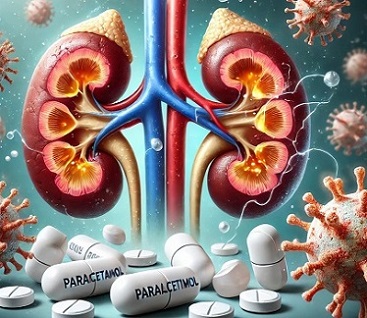Nikhil Prasad Fact checked by:Thailand Medical News Team Jul 01, 2024 10 months, 1 week, 1 day, 7 hours, 41 minutes ago
COVID-19 News: During the COVID-19 pandemic, many people were concerned about the safety of common painkillers like NSAIDs (non-steroidal anti-inflammatory drugs) and paracetamol (acetaminophen). Researchers from Bern University in Switzerland set out to understand if COVID-19 makes it riskier to take these medications.
 Does COVID-19 Affects Kidney and Liver Health When Taking Common Painkiller?
Image - AI Generated.
Background
Does COVID-19 Affects Kidney and Liver Health When Taking Common Painkiller?
Image - AI Generated.
Background
NSAIDs, such as ibuprofen and naproxen, are widely used to reduce pain and inflammation. Paracetamol, on the other hand, is a popular choice for lowering fever and alleviating pain. Both medications have known side effects. NSAIDs can sometimes harm the kidneys, and paracetamol can affect liver function.
The Study's Purpose
The research covered in this
COVID-19 News report, aimed to discover whether COVID-19 increases the likelihood of kidney or liver damage when taking these common medications. Two separate studies were conducted:
-Kidney Function and NSAIDs: To see if COVID-19 patients are at higher risk of kidney problems after taking NSAIDs.
-Liver Function and Paracetamol: To determine if COVID-19 increases the risk of liver issues after using paracetamol.
How the Study Was Conducted
The researchers looked at medical records from over 12,000 adult patients who had been tested for COVID-19 at the Bern University Hospital between January 2020 and November 2021. They compared patients who had taken NSAIDs or paracetamol and then checked their kidney and liver function before and after taking the medications.
For the kidney study, they included patients with an initially healthy kidney function and observed changes after taking NSAIDs. For the liver study, they monitored liver enzyme levels before and after paracetamol use.
Key Findings
Kidney Health and NSAIDs
-Among the patients studied, 288 experienced kidney function decline after taking NSAIDs, while 576 did not.
-Interestingly, having COVID-19 did not appear to significantly increase the risk of kidney damage from NSAIDs. Other factors like age, weight, and general health were more influential.
Liver Health and Paracetamol
-In the paracetamol study, 213 patients showed elevated liver enzyme levels, indicating liver stress, while 639 did not.
-Again, COVID-19 infection did not significantly increase the risk of liver damage from paracetamol. Factors like pre-existing liver conditions and overall health played a large
r role.
Implications of the Study
The findings are reassuring for those who need to use NSAIDs or paracetamol while having COVID-19. The research suggests that these medications do not pose a higher risk to kidney or liver health solely due to COVID-19. However, it remains crucial to consider individual health conditions when using these drugs.
Understanding the Risks
Despite these findings, it's important to use NSAIDs and paracetamol responsibly. Both drugs can have serious side effects if overused or taken in high doses:
-NSAIDs: Can cause kidney damage, especially in people with pre-existing kidney conditions. They can also lead to stomach ulcers and increased bleeding risks.
-Paracetamol: Overdose can lead to severe liver damage. It's essential to follow the recommended dosage and avoid combining it with alcohol or other drugs that stress the liver.
Future Research Directions
The study opens the door for further research to refine our understanding of how different health conditions, including COVID-19, interact with these common medications. More extensive studies could provide deeper insights into safe medication use during illness.
Conclusion
In summary, while COVID-19 has many health implications, this study provides some relief regarding the use of common painkillers like NSAIDs and paracetamol. They do not appear to increase the risk of kidney or liver damage specifically because of COVID-19. However, individual health factors are crucial, and it is always wise to consult with healthcare providers regarding medication use, especially during an illness like COVID-19.
This research highlights the importance of personalized medicine, where treatment decisions consider the unique aspects of each patient's health, ultimately leading to safer and more effective healthcare practices.
The study findings were published in the peer reviewed journal: COVID.
For the latest
COVID-19 News, keep on logging to Thailand Medical News.
Read Also:
https://www.thailandmedical.news/news/bmj-journal-warns-about-ibuprofen-use-in-treatments-for-fever-in-covid-19-patients--
https://www.thailandmedical.news/news/covid19-drugs-indomethacin-in-the-treatment-of-sars-cov-2-infections-a-promising-option
https://www.thailandmedical.news/news/george-washington-university-cohort-study-shows-that-aspirin-reduces-mortality-rates-in-hospitalized-patients-with-moderate-covid-19
https://www.thailandmedical.news/news/american-study-confirms-that-aspirin-use-is-associated-with-decreased-mortality-risk-in-covid-19-patients
https://www.thailandmedical.news/news/american-study-shows-that-taking-low-dose-aspirin-decreases-risk-of-severity-and-mortality-when-infected-with-covid-19
https://www.thailandmedical.news/news/breaking-university-of-maryland-study-shows-that-aspirin-use-reduces-risk-of-both-mortality-and-mechanical-ventilation-in-hospitalized-covid-19-patien
